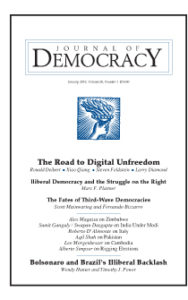 The good news is that democracy is not declining, at least in the aggregate. The bad news is that developing countries have taken a turn for the worse, notes Larry Diamond, a senior fellow at the Hoover Institution, Stanford University.
The good news is that democracy is not declining, at least in the aggregate. The bad news is that developing countries have taken a turn for the worse, notes Larry Diamond, a senior fellow at the Hoover Institution, Stanford University.
For democrats around the world, there is good news and bad news in the recently released Freedom House survey, “Freedom in the World 2019.” The good news—and we could really use some on the freedom front—is that things haven’t gotten dramatically worse. Or as The Economist Intelligence Unit found in its own annual Democracy Index, “Democracy stopped declining in 2018,” he writes for the American Interest:
Put differently, if you look past the seven advanced industrial democracies among these 27 largest countries, you find four democracies straining under the weight of corruption and crime (Brazil, Mexico, the Philippines, and South Africa); four countries where elected leaders have stifled democratic institutions or possibilities (Russia, Turkey, Bangladesh, and Tanzania); four countries where, in different ways, the military effectively dominates (Pakistan, Thailand, Myanmar, and Egypt); three entrenched dictatorships (China, Vietnam, and Iran); three huge arenas of political pluralism (India, Indonesia, and Nigeria); one African country where the door to democratic reform seems to be closing again (the DRC); and one—just one—with a real but tenuous possibility of democratic progress (Ethiopia).
 Unfortunately, this is a grimmer picture than one finds by just looking at the aggregate numbers. Big countries do generate bigger demonstration effects, adds Diamond, co-editor of the NED’s Journal of Democracy:
Unfortunately, this is a grimmer picture than one finds by just looking at the aggregate numbers. Big countries do generate bigger demonstration effects, adds Diamond, co-editor of the NED’s Journal of Democracy:
It is a reason to cherish and defend democracy in India and Indonesia; to watch carefully what happens in Nigeria as it meets its imminent electoral test; to support civic and institutional efforts to fight corruption and bolster the rule of law; to pressure de facto military regimes to really withdraw from political power; and to bet heavily on the one possibility for a big breakthrough to democracy in the coming year: Ethiopia.
Based on a deeply problematic business model, social-media platforms are showing the potential to exacerbate hazards that range from authoritarian privacy violations to partisan echo chambers to the spread of malign disinformation, adds Diamond. In democracies, the deleterious political effects of social media are making themselves felt through three broad mechanisms, he writes for the NED’s Journal of Democracy.







